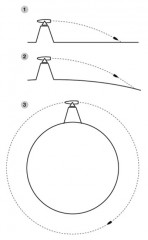Question
Why don't satellites and other orbiting craft fall out of the sky?
Answers (1)

by Ben Cracknell 13 years ago

I love this question because the answer is so easily understood - with diagrams of course!
Imagine you were to fire a missile horizontally from the top of a mountain, see diagram 1, the projectile will be pulled to the Earth and after some time hit the ground.
Now, if we enlarge our mountain to such a size that we begin to see the curvature of the earth, see diagram 2. Our projectile goes further because the earth appears to 'fall away'.
Finally we fire our projectile from an unfeasibly tall mountain, see diagram 3, and we find that the Earth's curvature matches exactly the projectile's curve as it falls. If there were no other factors involved, such as air resistance, the missile would circle the Earth, appear behind the cannon and collide with it. If we manged to remove our cannon in time the missile would simply keep on going, forever falling toward Earth and never reaching it because of the horizintal motion we had given it.
It would be in Orbit.
This shows us that objects in orbit are actually in free fall which explains why, despite being well withing the Earth's gravitational field, they are weightless.
This is not how satellites are launched. No, they are taken up into space in a rocket then propelled to the correct speed to orbit the Earth, and just keep falling from then on, occasionally they will need a corrective boost from small jets, other than that no power is needed to keep them in orbit.
Related Questions
